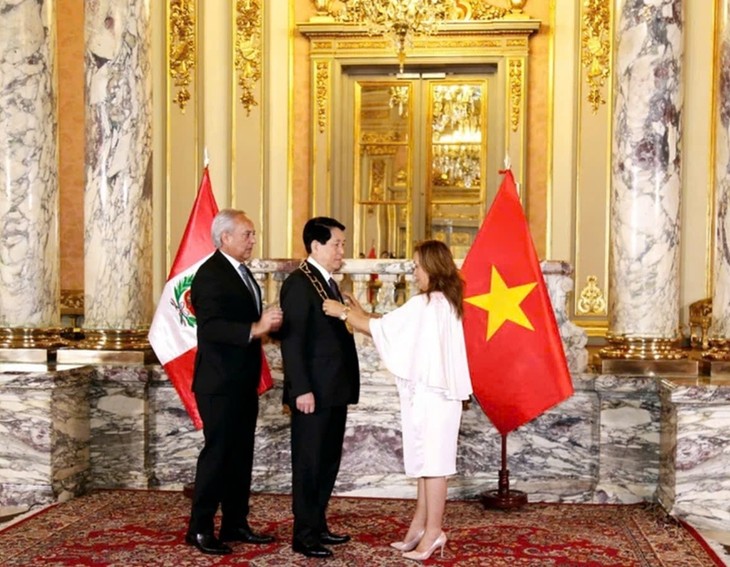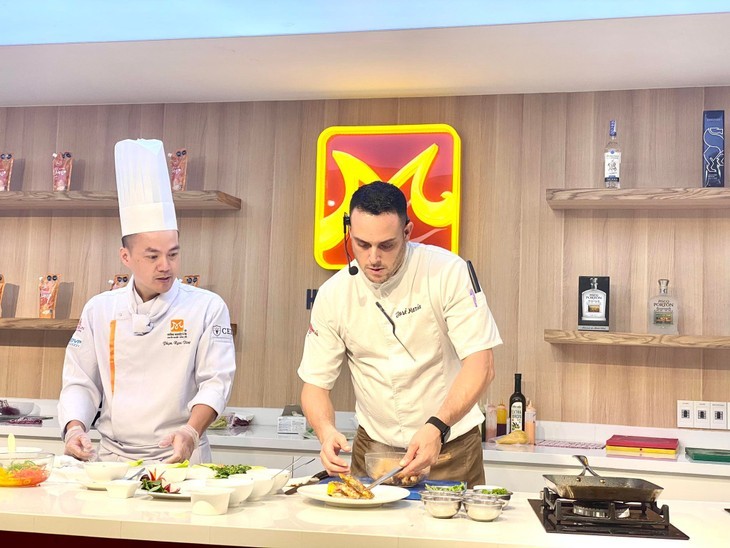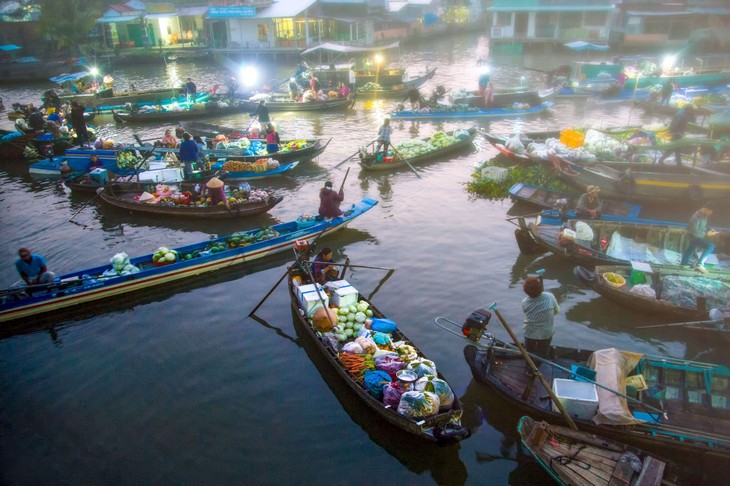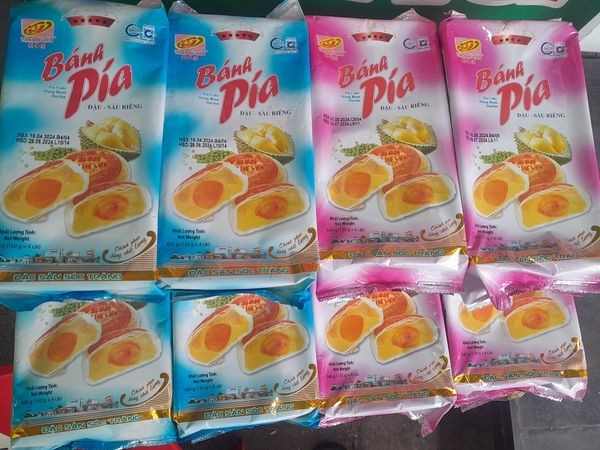B: I’m reading a letter from Peruvian listener Johnny Antonio Ramirez Lopez, who wrote: “Congratulations on November 14th! Congratulations on the 30th anniversary of the establishment of diplomatic relations, friendship, and cooperation between Peru and Vietnam. I hope the highest ideals of friendship and mutual cooperation will always inspire and strengthen the two countries’ bond.”
A: Thank you, Johnny, for remembering this special day. You told us an interesting fact – that despite being on opposite sides of the earth, Vietnam and Peru are connected by the Pacific Ocean. Both countries are working together to build a better foundation for their shared ideals, he added.
B: A couple of weeks ago, Vietnamese President Luong Cuong paid an official visit to Peru, where Peruvian President Dina Ercilia Boluarte Zegarra presented him with the Order of the Sun of Peru at a ceremony held in the Government Palace in Lima on November 13.
 President Dina Ercilia Boluarte Zegarra presented the Order of the Sun of Peru to Vietnamese President Luong Cuong. (photo: dangcongsan.vn) President Dina Ercilia Boluarte Zegarra presented the Order of the Sun of Peru to Vietnamese President Luong Cuong. (photo: dangcongsan.vn) |
President Cuong said: “The noble Order that I am honored to receive today is an encouragement for me to work harder, along with my Peruvian friends, to cultivate the cooperative relationship between Vietnam and Peru, aiming for new heights of substantive and effective development for the benefit of the two peoples, and for peace, stability, and prosperity in the two regions and the world.”
A: Receiving “The Order of the Sun of Peru” is a wonderful milestone, marking the 30th anniversary of bilateral diplomatic ties and demonstrating the special affection of the State and people of Peru for Vietnam.
B: Johnny told us: “We’ll move forward together, seek closer ties, exchange ideas, and better manage shared interests so that more Vietnamese investment projects, like Bitel, will be implemented in Peru. Vice versa, Peruvian investments will come to Vietnam.”
A: He said he hopes the new Vietnamese Embassy will soon open in Lima, along with a Peru-Vietnam Friendship and Cultural Centre, which would be a venue for exchanges and exhibitions of Vietnam’s development achievements, opportunities, and beautiful culture.
B: Thank you, Johnny for sharing your thoughts with us. We, too, sincerely hope for the bilateral ties to flourish.
 Peruvian chef José María Murga Brescia and Vietnamese chef Dang Ngoc Dung jointly prepare a dish that represents the intersection of their countries’ cuisines. (Photo: Bao Tram) Peruvian chef José María Murga Brescia and Vietnamese chef Dang Ngoc Dung jointly prepare a dish that represents the intersection of their countries’ cuisines. (Photo: Bao Tram) |
A: We received a message from Andy Lawendel of Italy. “I know you’re used to receiving reception reports from shortwave listeners around the world, but this time, it’s about your channel on mediumwave at 1242 kHz,” Andy said.
B: He listened to us from northern Italy – from a municipality called Borghetto di Vara near La Spezia in the Liguria region, close to the Mediterranean Sea, almost 10,000 kilometres from Vietnam. That’s amazing!
A: Here’s how he manages to pick up VOV’s signal from so far away. He has a new 25-meter “EWE type” antenna, which is connected to a Perseus SDR, an advanced software-defined radio designed and made in Italy.
B: We find the idea of a software-defined radio – whose modulators and filters and other electronic components are simulated on a computer – fascinating, as do, I’m sure, many of our Dx’er listeners. After tuning to our channel on November 4th from 15:30 to 16:00 UTC, Andy described a Vietnamese program with a conversation between two ladies, some songs, an announcement by a female voice, and a brief musical intermission before sign-off.
A: He recorded two clips of what he heard for confirmation. He said the signal was clear, though there was some interference from stations in Oman and India.
B: Your reception report checks out, sir, so we’ll send you a verification card. Thank you for your patience in listening to our program in Vietnamese. We look forward to soon receiving a reception report from you for our English program.
 A float market in Soc Trang province (photo: https://crystalbay.com/) A float market in Soc Trang province (photo: https://crystalbay.com/) |
A: Now let’s listen to a Vietnamese song “Soc Trang que minh” (Soc Trang my homeland) before we continue with letters from other listeners and answer a question about Pía cake, a specialty of Vietnam’s southern region.
B: The song “Soc Trang que minh” captures the serene beauty and rich culture of Soc Trang, a province in Vietnam’s Mekong Delta. The poetic lyrics and gentle melody reflect the lush landscapes, peaceful rivers, and cultural blend of many ethnic groups.
A: We played that particular song because Japanese listener Teraoka Akiyoshi asked us about Pía cake – where did it originate, what region makes the best cake, does it have other flavors besides durian?
B: Pia cake originated in Soc Trang province among the Chinese immigrants who came to southern Vietnam in the 17th century. Initially, it was a pastry made for religious ceremonies and other special occasions.
A: So it has Chinese roots.
B: Yes. Over time it evolved into a regional delicacy, a reflection of both the Chinese and Vietnamese culinary tradition. Pia cakes are made from layers of thin, flaky pastry filled with a sweet or savory filling. In addition to wheat flour, sugar, and vegetable oil, people incorporate such local Vietnamese ingredients as durian, green beans, and salted egg yolks.
 Pia cakes have many flavor. Pia cakes have many flavor. |
A: Durian is the most common flavor of pia cake. Some people love durian. Others still need more time to get used to it. But there are other variations, including taro, coconut, and lotus seed paste. Pia cakes are a specialty of the Mekong Delta, where people consume them and give them as gifts during the Mid-Autumn Festival and other festivals.
Ly Thai Nguyen, a dealer of Tan Hue Vien brand of Pia cake in Soc Trang, said: “Pia cakes for the Mid-Autumn Festival include more varieties. The savory filling contains a mixture of roasted chicken and fish fins. The sweet filling contains peanuts, red beans, black sesame, and lotus seeds.”
B: Pia cakes are a traditional way of celebrating the Full-moon Festival or welcoming family members to a reunion.
A: The next email is from Norwegian listener Hallvard Gjerde, who said he sent a reception report to VOV’s English section but had not received any reply.
B: Thank you for reaching out again, sir. We sincerely apologize to you. We checked our archive and found out that we overlooked your email. We’ll send you a QSL confirming your reception report for the program on September 11 at 16:00 UTC on the frequency of 11885 kHz.
A: We want to acknowledge a reception report from Pablo Urbina Capó, who tuned in to our frequency of 11885 kHz on November 20 in Palma De Mallorca, Balearic Islands, Spain.
B: Indian listener Apurba Kumar asked us to add his address to our mailing list for regular mailings.
A: Another Indian listener, Sufian Babu, told us that the golden age of radio listening and DX’ing have almost finished. He is now one of the few listeners left.
B: Dear listeners, we’re truly grateful for your continued support and interest. We hope you enjoy our broadcasts and find them informative, trustworthy, and entertaining.
A: Thank you again for being part of VOV’s radio community now and in the future. We welcome your feedback at English Service, VOVWorld, 45 Ba Trieu street, Hanoi, Vietnam.
B: Our email address is englishsection@vov.vn. Once again, thank you all for listening. Goodbye!